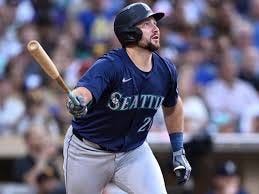Raleigh is earning his letters in Seattle
The catcher is approaching alltime records for slugging at his position. The playoffs are right there, too.
Todd Raleigh always had a sign on the wall. It said, “What’s Important Now,” which makes for a convenient acronym: WIN.
It was for the benefit of sons Cal and Todd Jr., who held a bat almost before they held a pacifier. It was like a lot of stay-in-the-moment things that athletes live by, but the problem was that Raleigh was a third-round choice of the Seattle Mariners, a team that has had Randy Johnson, Ken Griffey Jr., Alex Rodriguez and Edgar Martinez and never has been to a World Series. What’s Important Now? When Justin Turner was a Mariner for part of last season, he said winning, or investing in what it took to win, didn’t seem important at all to Seattle.
Cal Raleigh grew up to be a switch-hitting catcher, since Todd, the coach at Western Carolina and then Tennessee, had him switch-hitting when he was five. Suddenly, He’s Important Now. Raleigh is the first catcher, or switch-hitter at any position, to hit 30 home runs before the end of June, and he was the first to hit 20 home runs by June 1. Four times he’s hit home runs from both sides in the game, including at Cincinnati this year, and only Jorge Posada and Todd Hundley, among catchers, have done it more times than Raleigh.
On Friday, Raleigh slammed two more home runs as Seattle blanked Pittsburgh. He got to 35 and that tied Griffey Jr.’s record for home runs before the break. Why stop there? Catchers have only homered 40 times on eight occasions, including two by Mike Piazza, and Kansas City’s Salvador Perez has the record with 48 (for a player whose primary spot is catcher). Raleigh is hitting .271 with a 1.027 OPS, which is an improvement of .279 over last year. Meanwhile, the Mariners have the third wild-card spot in the American League, two-and-a-half games ahead of Boston.
Raleigh’s season goes into the Weird Improvement Notebook. He hit 34 homers and drove in 100 runs last year, but he also hit .228, and he came into this year with two big craters in his offensive game. For his career he was a .213 hitter at home, where he had hit only 49 of his 126 homers, and he was a .226 hitter against lefthand pitching. Last year he hit .183 against lefties.
Raleigh, of course, is not the first hitter to shiver in Seattle’s beautiful but dank ballpark, but this year he’s up to .243, with 17 of his 35 home runs at home. And he’s suddenly a .323-hitting terror against lefties, with 12 home runs in 101 plate appearances.
Part of it was a rigorous off-season program back in North Carolina, but another big part was an coaching shakeup brought on by new manager Dan Wilson, who was Seattle’s main catcher during its best years. Martinez now oversees the hitting, and Kevin Seitzer, fired by the Braves, is the hands-on instructor. It’s too simplistic to trace Atlanta’s offensive slumbers and Seattle’s revival to Seitzer alone, but the Mariners have gone from 10th last year to sixth this year in A.L. runs scored.
Seitzer’s suggestion was to devote all that focus to center-field and anything right of that. That way Raleigh would see the ball for maybe a few milliseconds longer. If he got out front he could still go deep to leftfield. The approach also sharpened Raleigh against righthanders. And because he had better vision he found it easier not to swing. Records have now become the only thing Raleigh is chasing.
He also knows the importance, now or any other time, of his ability to handle a talented young pitching staff. Raleigh won the Gold Glove for catchers last year, with six errors and a league-leading eight double plays. So far this season he has only two errors.
But by the time Raleigh’s off-season began, his hometown of Sylva was dealing with Hurricane Helene and a deluge that eventually killed 107 people throughout western North Carolina. Raleigh organized relief efforts through his Instagram account, and Turner, who is now with the Cubs and seemed to have little inclination to stay with the M’s, sent a truckload of supplies.
So why was Raleigh only a third-round pick out of Florida State? He had a left hand injury that led to a sub-par offensive year as a sophomore. He was still an All-American and helped the Seminoles get to a College World Series. He also went back fo his business administration degree.
When Cal was drafted by Seattle, Todd could only laugh. His son would be as far away as possible from Sylva while still in the majors. Todd is familiar with baseball’s siren song. He was very successful at Western Carolina, where Cal was a batboy as a kid. The Catamounts got to the NCAA regionals three times. That got Todd the Tennessee job, but he had a 42-78 record in SEC play and was invited to leave after his fourth year.
Atlanta is a lot closer to Sylva than Seattle is. It is also the scene of the All-Star Game. Todd will be throwing batting practice to Cal in the Home Run Derby, pushing Todd’s personal pitch count into the millions, and Todd Jr., at 15, will be wearing the catcher’s mask and the protector. Amid the hoopla, Raleigh will be repeatedly asked if he’s now the most logical candidate to pilfer Aaron Judge’s Most Valuable Player award. He’ll be polite and respectful, but MVP isn’t the abbreviation he’s after.




Enjoyed this!
He’s quite a story. You captures it well.